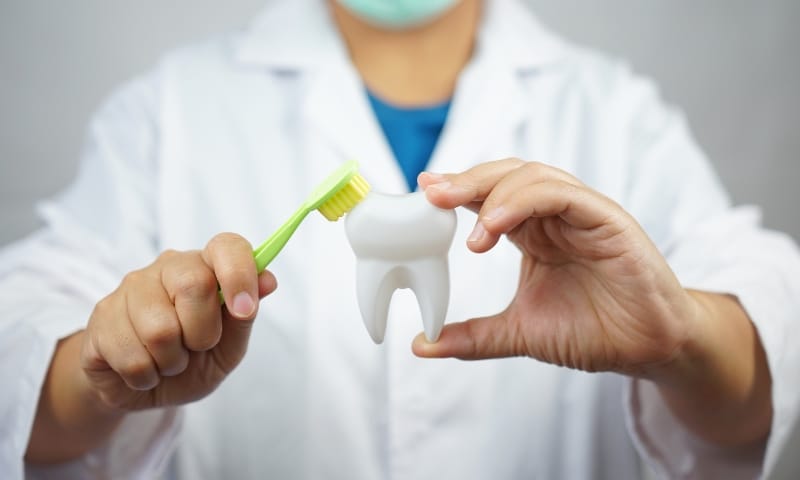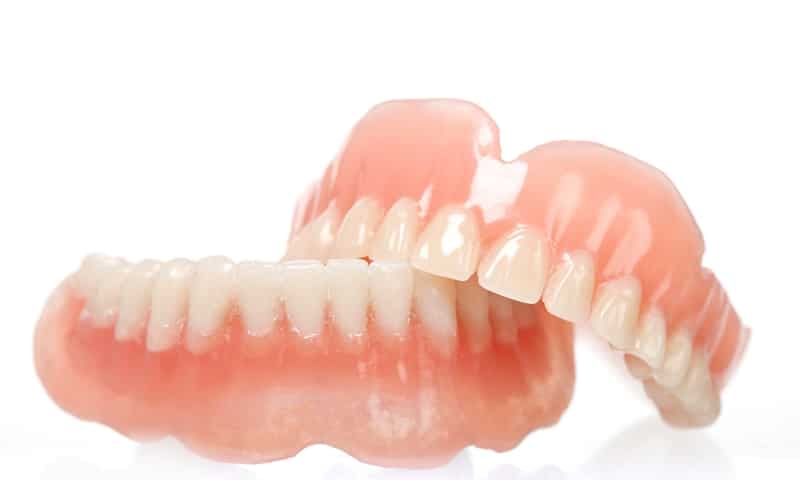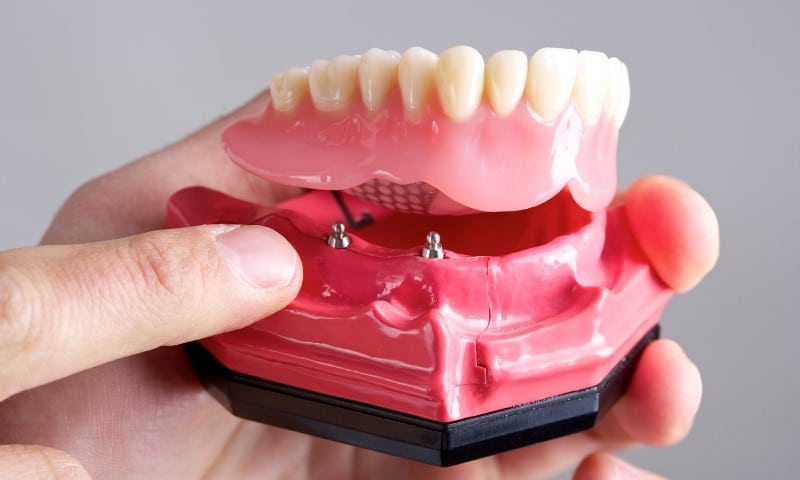How to Maintain Oral Health with Dentures?: Essential Tips

How Can Invisalign Correct Common Orthodontic Issues?
September 23, 2024
Teeth Whitening for Sensitive Teeth: Tips and Best Practices
September 30, 2024Maintaining oral health is crucial, even with dentures. While dentures replace natural teeth, they require proper care to ensure comfort and longevity. Dentures, whether full or partial, are custom-made devices that rest on your gums and help you eat, speak, and smile confidently.
However, dentures can lead to gum irritation, infections, or discomfort without proper care. This blog will explore how to care for dentures and maintain oral health. By following these essential tips, you can ensure your dentures are in excellent condition, providing you with a healthy, comfortable smile.
Understanding Dentures and Their Impact on Oral Health
Dentures are prosthetic devices designed to replace missing teeth. There are several types of dentures available:
- Full Dentures: Replace all teeth in the upper or lower jaw.
- Partial Dentures: Fill gaps when some natural teeth remain.
- Immediate Dentures: Placed right after tooth extraction to allow healing with teeth in place.
Each type serves a different purpose, and their impact on oral health varies. Dentures rest on the gums, and improper fit or care can lead to issues like gum irritation, sores, or even infections.
Full dentures may cause bone resorption, which means the jawbone shrinks over time due to a lack of stimulation from natural teeth. This can affect the fit of the dentures, leading to discomfort. Partial dentures can also stress surrounding natural teeth, making them more prone to damage if not well maintained.
Common issues denture wearers face include dry mouth, irritation from ill-fitting dentures, bad breath, and fungal infections like denture stomatitis.
While dentures improve quality of life, they also require extra care to keep your mouth and gums healthy. Let’s dive into essential care tips to help you avoid these issues and maintain your dentures in Olds.
Essential Tips for Maintaining Oral Health with Dentures
A. Cleaning Your Dentures Properly
- Clean your dentures daily to avoid plaque buildup and bacteria.
- Brush and rinse your dentures after every meal using a soft-bristled toothbrush and non-abrasive denture cleaner.
- Soak your dentures overnight in a denture solution or water to prevent them from drying out.
- Avoid regular toothpaste since it is too abrasive and can damage your dentures. Instead, use a cleaner specifically designed for dentures.
Regular cleaning prevents plaque and bacteria buildup that can lead to infections or bad breath.
B. Caring for Your Gums and Mouth
- Massage your gums daily using a soft brush or a clean cloth to stimulate circulation and remove food particles.
- Use mouthwash to maintain oral hygiene and keep your breath fresh. This also helps disinfect your gums and prevent fungal infections.
- Rinse after meals to remove any trapped food particles that could lead to irritation.
Even if you wear full dentures, caring for your gums is essential. Healthy gums support your dentures and prevent sore spots.
C. Handling Dentures with Care
- Store your dentures properly when not in use. Always soak them in water or a denture solution to prevent them from drying out.
- Handle your dentures carefully to avoid accidental damage or warping. Dry dentures can crack or lose shape, leading to discomfort.
- Act quickly if dentures break or become uncomfortable. Schedule an appointment with a dentist for repair or adjustment.
Proper storage and handling will extend the life of your dentures, ensuring they fit well and function properly.
D. Managing Oral Health Conditions
- Watch for signs of gum disease, such as redness, swelling, or bleeding. Early detection can prevent serious issues.
- Stay hydrated and use mouth moisturizers or saliva substitutes to prevent dry mouth, which is common with denture wearers.
- Seek professional help if you experience persistent sore spots or discomfort. Your dentist can adjust the dentures for a better fit and screen for infections or other issues.
By recognizing the early signs of problems, you can keep your mouth healthy and your dentures comfortable.
Regular Check-ups with Dentist
Regular check-ups are essential for denture wearers. Dentists ensure your dentures fit well and help prevent oral health problems. Over time, dentures can become loose as your gums and jawbone change. Ill-fitting dentures can lead to sores, irritation, or infections.
Your dentist can adjust or realign the dentures to restore a comfortable fit. Routine check-ups also allow the dentist to examine your gums, mouth, and any remaining natural teeth for signs of disease or infection. Regular professional cleanings can also remove hard-to-reach plaque that may accumulate over time.
For most denture wearers, scheduling a check-up every six months is best. However, if you experience any discomfort or issues with your dentures, you should see your dentist sooner.
Diet and Nutrition for Denture Wearers
Your diet plays a significant role in maintaining your oral health with dentures. Some foods, like sticky or hard items, can damage or dislodge your dentures. It is best to avoid chewy foods like caramel, crunchy snacks like nuts, and hard items like corn on the cob.
To ease the adjustment to eating with dentures, start with soft foods like mashed potatoes, scrambled eggs, or cooked vegetables. Over time, you will become more comfortable with a variety of foods.
A well-balanced diet rich in vitamins and minerals is vital for overall gum and mouth health. Nutrients like calcium and Vitamin D support bone health, while Vitamin C helps heal tissues and prevent infections.
When to Replace or Adjust Your Dentures?
Dentures do not last forever, and it is essential to recognize when they need to be adjusted or replaced. Signs that your dentures may need adjustment include slipping while talking or eating, discomfort, or changes in how they fit. If the dentures are rubbing against your gums, you may also experience sore spots in your mouth.
On average, dentures need replacing every 5 to 7 years. However, this can vary based on wear and tear, changes in your jaw, or gum health. Stay on top of denture maintenance to avoid complications and ensure they remain comfortable.
Maintaining oral health with dentures is crucial for long-term comfort and oral hygiene. You can enjoy a healthy, confident smile by cleaning your dentures, caring for your gums, and scheduling regular dental check-ups. Proper care helps prevent common denture-related issues and keeps your mouth in great shape.
If you wear dentures, consider seeing our dentist regularly for adjustments and professional advice. With proper care, dentures can offer a beautiful, worry-free smile.




